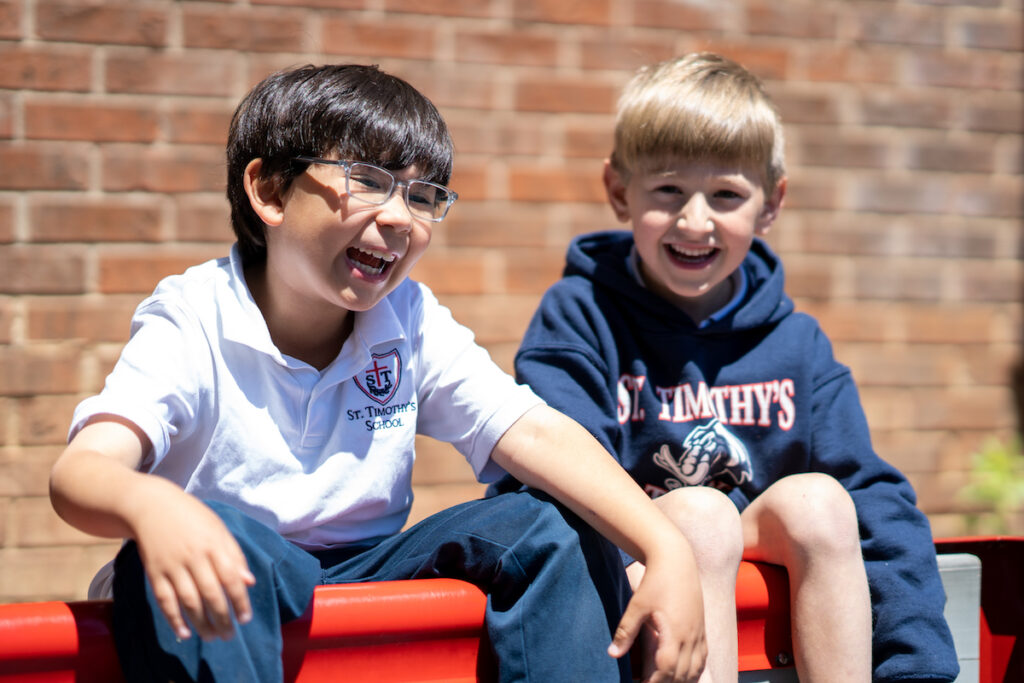Social-emotional learning is a pillar of a child’s lifelong learning journey. Woven throughout conventional academic subjects, social-emotional learning opportunities allow children to manage daily challenges, build positive relationships, and make informed decisions.
At St. Timothy’s School, we incorporate a balanced curriculum emphasizing both traditional academia and social-emotional learning opportunities. From self-awareness to responsible decision-making, our students develop non-cognitive skills vital to their success inside and outside the classroom. Read below to learn more about social-emotional learning skills and how St. Timothy’s incorporates them into our curriculum.
What is Social-Emotional Learning?
Social-emotional learning is an educational approach targeting a student’s non-cognitive skills such as self-awareness, self-management, relationship building, social awareness, and responsible decision-making. With a better understanding of their emotions, children become more introspective and learn how to manage their feelings, solve problems, and get along with others. The five core components of social-emotional learning include:
Self-awareness
Children who practice self-awareness recognize the connection between their emotions and behaviors and acknowledge how their strengths and weaknesses affect their overall confidence.
Self-management
Developing self-management skills allows children to take better control and ownership of their thoughts, feelings, and behaviors and set goals for themselves.
Social awareness
A child with high social awareness has the ability to empathize with others with different upbringings and interests.
Relationship building
Relationship building involves developing and maintaining healthy connections with others. By developing relationship skills, children become better listeners and communicators.
Responsible decision-making
Responsible decision-makers consider ethics, safety, consequences, and impact when deciding how to act or respond in a situation.
What are the Benefits of Social-Emotional Learning?
Engaging in social-emotional learning activities has both short and long-term benefits for students. On a daily basis, students will see progressive improvements in their ability to know and manage themselves, understand other peoples’ perspectives, and make responsible decisions. These consistent improvements will result in long-lasting social-emotional competence, which students will utilize well beyond their academic years.
When engaging in social-emotional learning activities, students will reap the following benefits:
Stronger sense of self
Social-emotional learning enables students to take charge of their emotions and become more introspective. As a result, students become more confident in themselves and can practice better self-awareness, self-management, and self-control.
Better relationships
Social-emotional learning lays the foundation for a child’s approach to relationships. By introducing concepts of diverse experiences and perspectives, listening skills, and community building, social-emotional learning lessons encourage empathy and connection among students.
Improved academic performance
The confidence instilled in a student through social-emotional learning allows them to perform better in school. When feeling comfortable asking questions, collaborating with others, and putting intentional effort into their studies, students yield better grades and test scores.
How is Social-Emotional Learning Incorporated in School?
Teachers can implement social-emotional learning activities into their daily curriculum in many ways. From art projects to group reading circles, social-emotional learning takes many forms in the classroom. Generally, teachers use the following steps when teaching social-emotional learning lessons:
- The teacher explains the lesson with visuals, written text, video, and audio.
- Students learn and practice concepts through group discussion, skill practice, and individual assignments.
- The teacher reinforces the idea throughout their weekly lesson plans.
- The teacher assigns homework related to the social-emotional concept.
- The teacher checks back in periodically on their students’ comprehension and re-teaches specific points if necessary.
At St. Timothy’s School, our school counselors lead monthly social-emotional learning lessons for lower school students and weekly lessons for middle school students. Educating with intention, our teachers take those lessons and weave them into our daily curriculum to help students become more seasoned, reflective thinkers.
Private Education at St. Timothy’s School
St. Timothy’s School is a private school in Raleigh, NC, that offers enriching social-emotional learning opportunities to create a well-rounded learning experience for students. Our research-based curriculum emphasizes the importance of non-cognitive skill development, helping students become better listeners, communicators, and critical thinkers. Visit our website today to learn about social-emotional learning at St. Timothy’s School.


